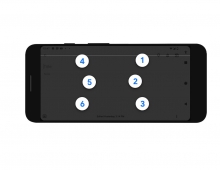
First Targeted Attack Utilising Malware for Android Devices Reported
Kaspersky Lab has detected the first serious targeted attack on Android-based mobile devices staged by Chinese-speaking authors and designed to steal contacts, messages and other information.
The security firm reported that a targetted attack against Uyghur activists which, for the first time, was based on a malicious program for Android-based mobile devices. Kaspersky said the attack was designed and performed in a similar manner as numerous other attacks on Uyghur and Tibetan activists, but instead of relying on exploit-rigged DOC, XLS or PDF documents for Windows-based computers or Macs, it targeted mobile devices.
The Android malware used in the new attack steals private data from infected smartphones, including the address book and messaging history, and sends it to a command and control server, Kaspersky says.
The attack took place at the end of March 2013 and started with the hacking of an email account belonging to a high-profile Tibetan activist. The attackers used this account to send 'spear-phishing' emails to his contact list. The malicious messages targeted Mongolian, Chinese, Tibetan and Uyghur political activists, and had attached an .APK file containing a malicious program for Android devices. Investigation of this malware performed by Kaspersky Lab's experts revealed that it was most likely designed by Chinese-speaking authors, judging by comments in the code and certain characteristics of the command and control server.
Costin Raiu, Director, Global Research & Analysis Team, Kaspersky Lab comments; "Until now we have not seen targeted attacks against mobile devices in the wild, although there were signs that attackers were interested and experimenting in this field. This particular attack utilises a fully featured Trojan aimed at stealing private data from a targeted group of victims. The attackers have so far used social engineering to trick the victims into installing the app. However, we believe that in the future such attacks will exploit vulnerabilities in mobile software, or a combination of techniques."
The Android malware used in the new attack steals private data from infected smartphones, including the address book and messaging history, and sends it to a command and control server, Kaspersky says.
The attack took place at the end of March 2013 and started with the hacking of an email account belonging to a high-profile Tibetan activist. The attackers used this account to send 'spear-phishing' emails to his contact list. The malicious messages targeted Mongolian, Chinese, Tibetan and Uyghur political activists, and had attached an .APK file containing a malicious program for Android devices. Investigation of this malware performed by Kaspersky Lab's experts revealed that it was most likely designed by Chinese-speaking authors, judging by comments in the code and certain characteristics of the command and control server.
Costin Raiu, Director, Global Research & Analysis Team, Kaspersky Lab comments; "Until now we have not seen targeted attacks against mobile devices in the wild, although there were signs that attackers were interested and experimenting in this field. This particular attack utilises a fully featured Trojan aimed at stealing private data from a targeted group of victims. The attackers have so far used social engineering to trick the victims into installing the app. However, we believe that in the future such attacks will exploit vulnerabilities in mobile software, or a combination of techniques."





















